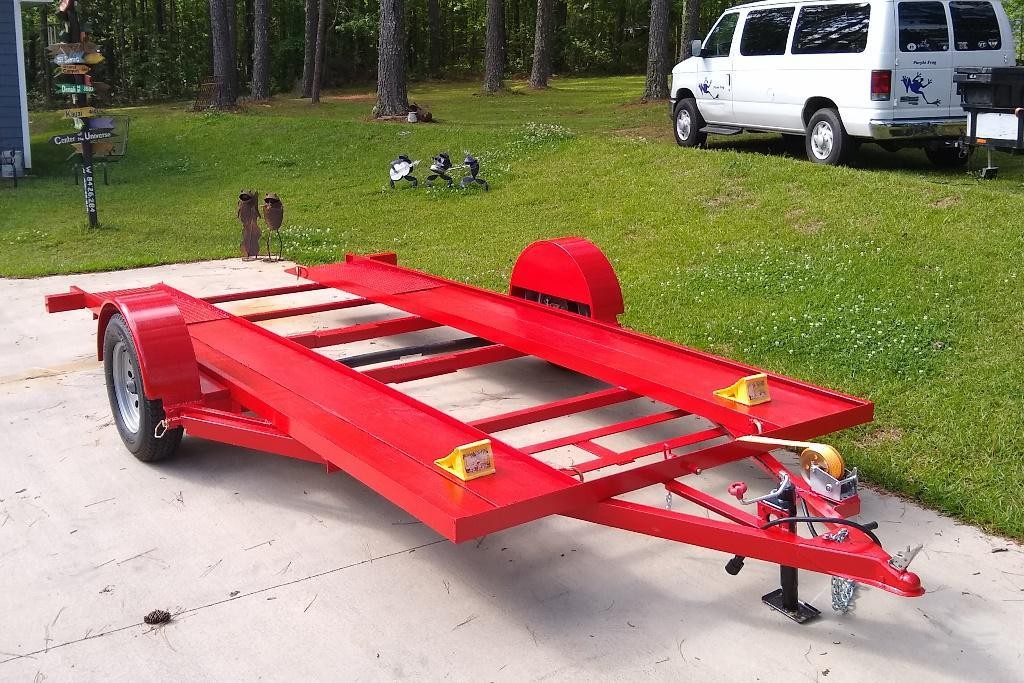Single Axle Car haulers offer a lightweight and cost-effective solution for transporting smaller vehicles. But are they the right choice for you? This guide explores the pros and cons of single axle car trailers, factors to consider when choosing one, and some popular options available.
A single axle car hauler, like the one pictured above, can be a practical solution for transporting smaller vehicles.
Understanding Single Axle Car Haulers
Single axle car haulers, as the name suggests, utilize a single axle with two wheels to support the trailer and its load. This design contributes to their lighter weight compared to dual-axle trailers, making them easier to tow with smaller vehicles and potentially improving fuel efficiency. Their simpler construction often translates to a lower purchase price.
The single axle design, as seen in this image, contributes to the trailer’s lighter weight and maneuverability.
However, single axle trailers have limitations. Their lower load capacity restricts them to hauling lighter vehicles. Stability can also be a concern, especially in challenging conditions or with improper loading. A tire blowout on a single axle trailer can be more dangerous than on a dual-axle trailer, as there’s no redundant tire to maintain control.
Factors to Consider When Choosing a Single Axle Car Hauler
Several factors should influence your decision when considering a single axle car hauler:
-
Tow Vehicle Capacity: Ensure your tow vehicle has the necessary towing capacity to handle the combined weight of the trailer and the vehicle being hauled.
-
Load Capacity: Carefully assess the weight of your vehicle and compare it to the trailer’s Gross Vehicle Weight Rating (GVWR). Always allow for a safety margin.
-
Trailer Dimensions: The trailer bed should be long and wide enough to accommodate your vehicle securely. Consider factors like wheelbase and track width.
-
Deck Height: A lower deck height reduces the loading angle and can be crucial for low-clearance vehicles.
-
Ramp or Gate: Decide whether built-in ramps or a tilting bed with a rear gate better suits your loading needs. Ramps integrated into the trailer, as shown below, can offer convenient loading.
-
Brakes: Electric brakes are highly recommended for enhanced safety and control, especially when hauling heavier loads.
-
Tire Quality: Invest in high-quality tires with a load rating appropriate for the trailer’s GVWR. Regularly inspect tires for wear and tear. Proper tire maintenance is crucial for safe towing.
Exploring Alternatives and Custom Options
While commercially available single axle car haulers like the Echo UTV trailer offer convenient solutions, custom-built options provide flexibility for specific needs.
A custom-built trailer might be necessary if your vehicle has unique dimensions or weight requirements. Consider consulting with a trailer manufacturer to discuss your specific needs. They can advise on axle capacity, bed size, and other critical features.
Conclusion: Making the Informed Decision
Choosing the right single axle car hauler requires careful consideration of your vehicle’s weight and dimensions, your tow vehicle’s capabilities, and your budget. While single axle trailers offer a lightweight and affordable option, prioritize safety and ensure the trailer meets your specific hauling requirements. Remember to factor in the cost of quality tires and potentially adding electric brakes for optimal safety and performance. A properly chosen single axle car hauler can provide years of reliable service for transporting your vehicle.

